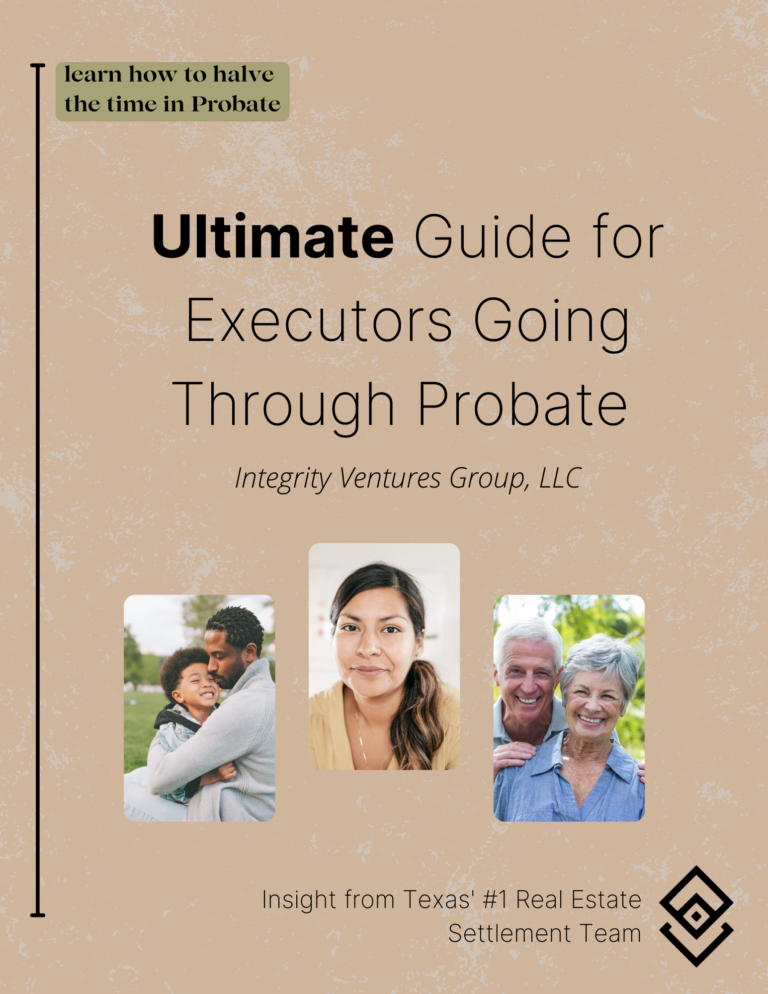do you want to cut your probate Process time in half?
Probate Process for Inherited Property in Texas: A Step-by-Step Guide
disclaimer
Integrity Ventures Group asserts that it is not a licensed lawyer, and this article is intended solely for providing general guidance and information, and should not be considered as legal advice or a substitute for consulting with a qualified attorney. For any specific legal grievances related to personal probate cases, we strongly advise individuals to seek professional legal counsel and engage the services of a licensed attorney.
At Integrity Ventures Group, we pride ourselves on being the premier estate settlement firm in Texas. Our expertise lies in assisting families daily, helping them unravel the complexities of their probate proceedings alongside their attorneys. We would be honored to extend our knowledge to help guide you through your unique journey as well. Let’s Dive into: the probate process of inherited property in Texas.
Introduction
Inheriting property can be a bittersweet experience, tinged with both the joy of new assets and the sorrow of losing a loved one. As with any form of inheritance, Texas has its own unique probate laws and procedures that must be adhered to when inheriting real estate or other valuable property. The probate process for inherited property can be a labyrinth of legal steps and deadlines. This guide aims to help you understand and navigate the intricacies of inheriting property in Texas.
Table of Contents
- The Significance of Inherited Property
- Types of Property Subject to Probate
- Probate and Real Estate
- Determining Ownership
- Managing Inherited Property
- Special Cases: Trusts, Joint Tenancies, and More
- Common Pitfalls and How to Avoid Them
- Conclusion
The Significance of Inherited Property
Inherited property is more than just a physical asset. It carries emotional weight and often has tax implications. Understanding the probate process is vital to ensuring that property transitions smoothly from the deceased to the living, ensuring the legacy of your loved one is honored.
Types of Property Subject to Probate
Probate isn’t limited to houses and land. Other forms of property like cars, jewelry, and even digital assets like cryptocurrency may go through probate. Understanding what types of property are subject to this process helps you know what to expect.
Probate and Real Estate
One of the most common forms of inherited property in Texas is real estate. Several key steps are crucial for a smooth transition:
- Valuation: A fair market value of the property is obtained, often involving a professional appraiser.
- Title Transfer: Once probate is completed, the property title can be transferred to the new owner.
- Tax Assessment: Inherited property often comes with a tax liability, including potential estate and inheritance taxes.

Determining Ownership
If the deceased left a will, the executor is responsible for distributing assets according to the will’s directives. If there is no will, Texas intestacy laws come into play, and the state outlines who has a rightful claim to the inheritance, often beginning with the closest relatives.
Managing Inherited Property
After inheriting property, beneficiaries have several options:
- Sell the Property: This is often the quickest way to distribute the asset’s value but can involve capital gains tax.
- Rent the Property: Converting the property into a rental can provide a steady income stream.
- Move In: The inheritor may choose to make it their residence.
- Hold as an Investment: Some may choose to hold onto the property as a long-term investment.
Special Cases: Trusts, Joint Tenancies, and More
There are special instances where property inheritance doesn’t require probate:
- Living Trusts: Property in a living trust bypasses probate.
- Joint Tenancy with Right of Survivorship: Automatically passes to the surviving tenant.
- Life Estates: Allows a person to live in a property for their lifetime, after which it passes to a designated recipient without probate.
Common Pitfalls and How to Avoid Them
- Ignoring Timelines: Failing to meet legal deadlines can delay the process.
- Underestimating Taxes: Always consult a tax advisor to understand the implications fully.
- Conflict Among Heirs: Sometimes family disputes can erupt; having clear communication is crucial.
Conclusion
Navigating the probate process for inherited property in Texas can be a complicated endeavor. From understanding the types of assets subject to probate to managing the newly acquired property wisely, several factors must be considered.
FIND MORE HELPFUL ARTICLES LIKE THIS ONE
DOWNLOAD YOUR PROBATE CHECKLIST TODAY.
Become a part of the numerous executors who have already benefited from our free guide. Elevate your probate process with our complimentary probate checklist, designed to guide you step by step through the process of selling your real estate property today. Download it now and streamline your journey through probate.






